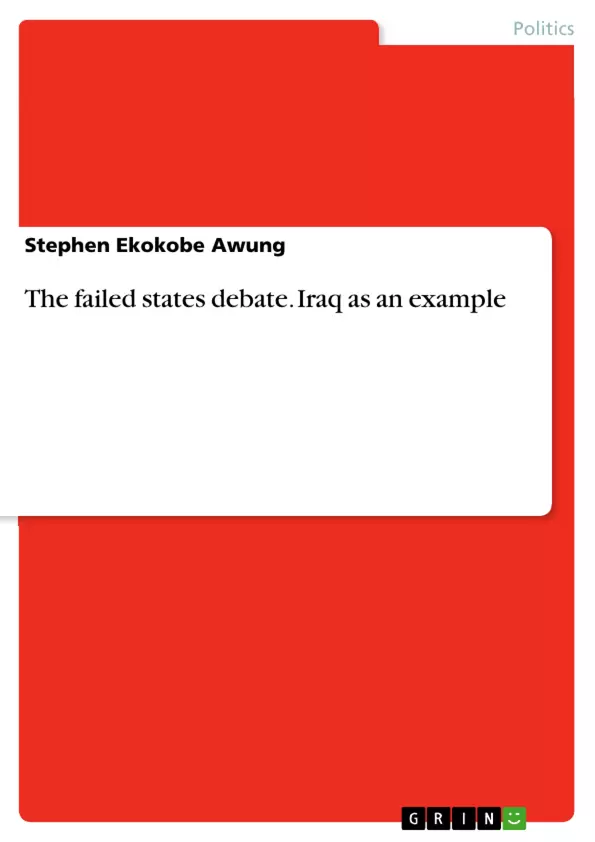This essay is about the controversy in the failed states debate in international politics with Iraq as an example. The author argues that anticipated retaliation without the UN mandate is a danger to world peace.
Before the terrorists attack on Washington and New York, experts in International Relations were discussing and analyzing the clash of civilization by Huttington, an American political scientist. According to Huttington, the next conflict that will confront mankind in the 21st century would be a class of civilization. He identified some major civilizations which include the western civilization, the Islamic civilization, the Hindu civilization, the Hispanic civilization, the Japanese civilization, the Jewish civilization and may be an African civilization.
When the incident of September 11 occurred, many people thought that is a confirmation of Huttington’s theory, but Huttington himself refused to regard the attacks as a clash between the western and Islamic civilizations. This very question was put to Gerhard Schroeder and other western leaders and they all refused to consider this event as a clash of cultures. But what I find contradictory is that these same leaders claim that September 11 was not only an attack on America but an attack on the western civilization or the civilized world.
Due to Bush’s new war on terrorism, most authorities on International Relations are focusing now on failed states. According to them, failed states are the greatest threat to the world and have no right to exist. Failed states are states that are unable to provide essential services to their people like security, which they consider the most important factor, social services like hospitals, schools, and even employment. Researchers claim that failed states are the breeding ground of terrorists, and classical examples according to them are Afghanistan, Somalia, DRC, Columbia, Rwanda, Iraq just to name but these. The debate on failed states like that of terrorism is a complex one.
If we want to analyse the debate on failed states critically, we have to look at the source of the recent debate, colonialism, the bipolar world, the US hegemonic power and international security.
Table of Contents
- Introduction
- Meaning and theories explaining failed states
- Failed states and international security
- Iraq as an example
- Conclusion
Objectives and Key Themes
This article critically examines the debate surrounding failed states, particularly focusing on the case of Iraq. It aims to challenge the dominant Western perspective that portrays failed states as inherent threats to international security and justifies interventionist policies.
- The historical context of the failed states debate, including colonialism, the Cold War, and the rise of US hegemony.
- The problematic definition and criteria used to classify states as "failed" and the dangers of applying such labels.
- The role of international relations theory in shaping the perception and treatment of failed states.
- The potential consequences of the "failed states" paradigm for global security and stability.
- An examination of the case of Iraq, exploring the factors that contributed to its instability and the implications of Western intervention.
Chapter Summaries
- Introduction: The article introduces the topic of failed states, tracing its origins to the post-Cold War era and the rise of US hegemony. It critically examines the prevailing narrative that casts failed states as inherently dangerous and deserving of intervention, citing examples of the "anticipatory self-defense" doctrine used to justify military actions.
- Meaning and Theories Explaining Failed States: This section delves deeper into the concept of failed states, questioning its applicability to developing countries and highlighting the potential for misuse by powerful nations. The article emphasizes the role of colonialism, the Cold War, and Western influence in perpetuating state weakness and vulnerability.
- Failed States and International Security: This chapter explores the link between failed states and international security, arguing that the existing international system is inherently biased against developing countries. It criticizes the notion that failed states are solely responsible for their own misfortunes and emphasizes the role of global power dynamics in exacerbating state fragility.
Keywords
Failed states, international security, international relations, colonialism, Cold War, US hegemony, state weakness, state fragility, Western intervention, Iraq, anticipatory self-defense, global power dynamics.
What is the definition of a "failed state" in international politics?
Failed states are defined as states unable to provide essential services to their people, such as security, healthcare, education, and employment. They are often viewed as breeding grounds for terrorism.
Why is Iraq used as an example in this debate?
Iraq is examined to explore the factors contributing to state instability and the consequences of Western intervention based on the "failed states" paradigm.
What is the author's critique of the failed states theory?
The author argues that the label "failed state" can be misused by powerful nations to justify intervention without a UN mandate, which poses a danger to world peace.
How does Huntington's "Clash of Civilizations" relate to this topic?
The essay discusses how the 9/11 attacks were initially seen by some as a confirmation of Huntington's theory, though many leaders and Huntington himself later rejected this simplification.
What role did colonialism play in state fragility?
The debate highlights that state weakness in developing countries is often rooted in historical contexts like colonialism, the Cold War, and global power imbalances rather than just internal failure.



